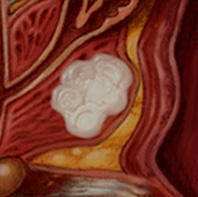Vitamin D does not protect from prostate cancer

Results from a study by researchers at the National Cancer Institute in Bethesda, Maryland do “not support the hypothesis that vitamin D is associated with decreased risk of prostate cancer; indeed, higher circulating 25(OH)D [vitamin D] concentrations may be associated with increased risk of aggressive disease.”
First, the details.
- 749 patients with prostate cancer were compared to 781 men who were matched by age, time since taking the initial blood sample, and year of entry into the study.
And, the results.
- No statistically significant trend in overall prostate cancer risk was observed with increasing season-standardized serum 25(OH)D level.
- However, compared to men with the lowest 25(OH)D blood levels, there appeared to be increased risk of aggressive disease in men with higher vitamin D blood levels.
- The association with aggressive disease was consistent across subgroups defined by age, family history of prostate cancer, diabetes, body mass index, vigorous physical activity, calcium intake, study center, season of blood collection, and assay batch.
The bottom line?
The authors acknowledge that these results are based on a single blood level of vitamin D. And studies such as this one are limited in what they reveal about cause and effect relationships.
The rationale supporting the vitamin D/prostate cancer association was based, in part, on observations (epidemiological studies) that prostate cancer is more common in sun-starved northern countries. Less sun exposure is associated with less vitamin D production, and…well…you get where that was going. You might want to read this web page from the Harvard Gazette Online soon, as it’s not likely to be posted much longer.
It’s important not to get confused between an “association” and “causation.”
5/29/08 10:45 JR